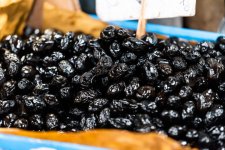kosta_karapinotis
Active member
These olives are also known as "cracked olives." They're not as popular as Kalamata olives but their texture makes them super unique and tasty. They come from the Attica region and they are harvested when they are green. The olives get their texture because they are brined and from the way they are prepared.




